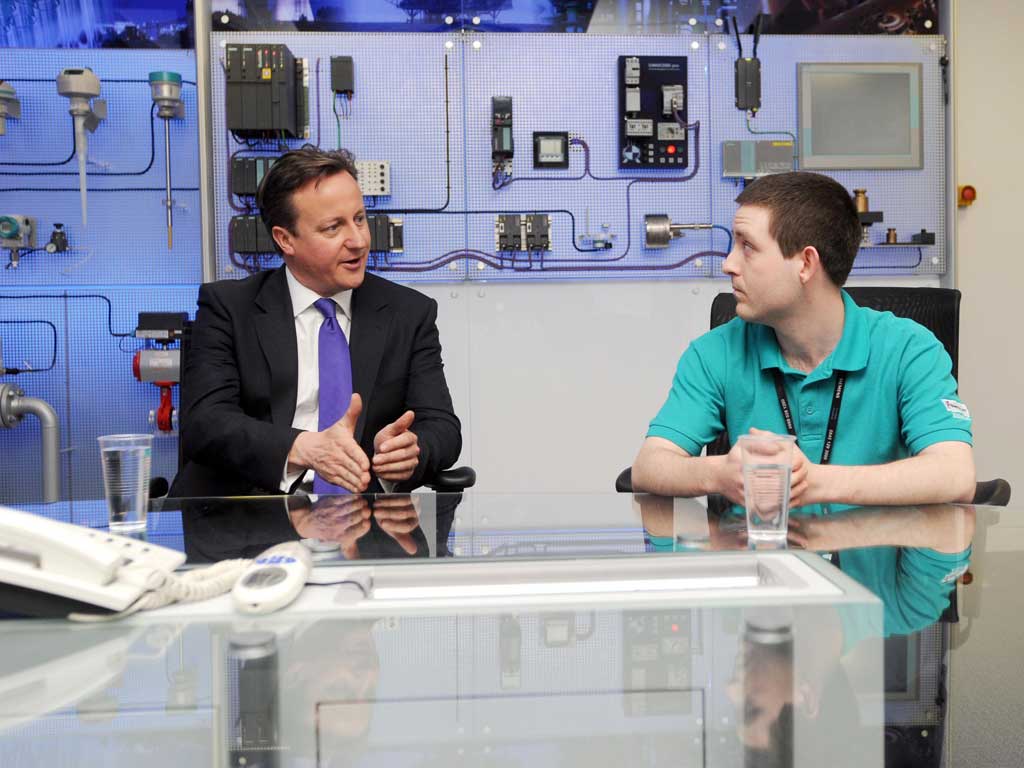David Cameron to tell Angela Merkel she is the only person who can save euro
PM will urge German Chancellor to use her country's wealth to shore up single currency

David Cameron will today press the German Chancellor, Angela Merkel, to come to the rescue of Greece and other ailing European economies or risk the collapse of the single currency.
Amid growing alarm within the Treasury over the impact of the crisis on Britain, a close ally of Chancellor George Osborne warned the financial contagion in Greece could spread across southern Europe.
Mr Cameron flies to the United States today for talks with major industrial leaders, including Ms Merkel, hosted by Barack Obama at his Camp David retreat.
The two-day G8 summit will be dominated by the renewed financial storm following the political deadlock in Greece and fears that the eurozone's uncertain future could affect all western nations.
He will join other leaders in urging Ms Merkel to authorise German intervention to shore up the EU's weaker currencies.
Despite his political differences with François Hollande, Mr Cameron is likely to receive the backing of the new French President in casting the spotlight on the German government.
The Prime Minister delivered his gloomiest warning yet of the dangers of the Greek debt crisis yesterday, making clear he felt hopes of rescuing the eurozone lie with Germany, whose economy is still growing strongly.
Warning the single currency was at a "crossroads," he said monetary union meant that successful economies must be prepared to do more to shore up weaker states on the periphery.
"We need to be clear about the long-term consequences of any single currency," he told business leaders in Manchester. "In Britain we have had one for centuries. When one part of the country struggles, other parts step forward to help. There is a remorseless logic to it."
The Prime Minister also argued that eurozone leaders needed to erect an "effective firewall" to prevent financial contagion spreading between economies and to ensure their banks were "well-capitalised and regulated".
Failure to do that, he said, would mean "we are in uncharted territory which carries huge risks for everybody". Mr Cameron reiterated the message in a video conference ahead of the G8 summit with Ms Merkel, Mr Hollande, Mario Monti, the Italian Prime Minister, Herman Van Rompuy, President of the European Commission, and José Barroso, President of the European Council.
A Downing Street spokesman said: "The Prime Minister emphasised the importance of Greece and the eurozone taking decisive action to ensure stability and prevent contagion."
Michael Fallon, the Tory deputy chairman, who is close to Mr Osborne, said Mr Cameron was right to warn of the potential danger.
He said: "If they don't sort out the mess in Greece and put a sufficient firewall around Greece to stop the contagion spreading across the Mediterranean, and if they don't focus on growth, then that is going to drag everybody down."
Vince Cable, the Business Secretary, sought to calm nerves as he cautioned against panic and insisted the economy would only be in jeopardy if the euro crisis spread beyond Greece.
He said: "Greece itself is a small country, it's only 2 per cent of the European economy. The risks arise if the crisis were spread to other weaker countries in southern Europe, but there is no reason why that should happen."
But Ed Balls, the shadow Chancellor, accused the Government of using the eurozone crisis as cover for Britain's double-dip recession.
Obama wants EU to ease up on austerity
The US is to offer Europe prescriptions to stimulate growth and stave off further turmoil in the eurozone.
At the G8 meeting starting tonight, Barack Obama is expected to reiterate the view that the German Chancellor Angela Merkel's austerity-only approach must be counter-balanced with some stimulus spending. As the G8 leaders discuss "actions" to restore growth in the EU, Mr Obama will remind them of his own record of signing an $862bn stimulus package in 2009 when the US was tilting into a depression.
Tom Donilan, the National Security adviser, said the US had "an extraordinarily significant stake in the outcome of... the steps that are taken in Europe".
David Usborne
Join our commenting forum
Join thought-provoking conversations, follow other Independent readers and see their replies
Comments
Bookmark popover
Removed from bookmarks